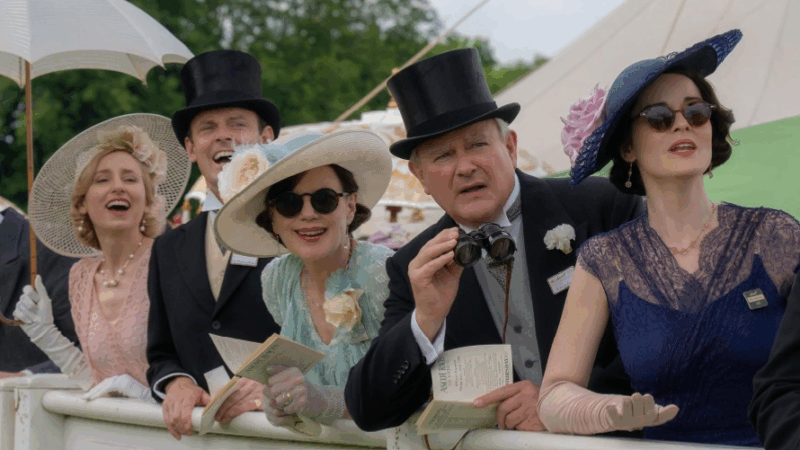After 6 seasons and 3 movies, ‘Downton Abbey’ bids farewell (or does it?)
Ever since the events of Downton Abbey began in 1912, the characters haven’t been able to stop talking about how quickly the world around them is changing. Paradoxically, the constant repetition of this idea has made the show — and the movies — feel comfortingly, and sometimes annoyingly, static.
Sure, a lot has happened over six seasons and two movies: a world war, an epidemic, inventions, revolutions, births, deaths, marriages, scandals and an awful lot of servant turnover. But the class constraints and gender roles of the era are still largely in effect. The winds of progress sure do take their sweet time, and so does the creator and screenwriter Julian Fellowes, who’s clearly reluctant to say goodbye to these characters or upend their world order too abruptly.
And so we have a third movie, Downton Abbey: The Grand Finale, which sounds like a pretty definitive farewell, but who knows. Either way, it’s much better than the previous movie, Downton Abbey: A New Era, which felt smug and preposterous even for a series that has always been unapologetically both.
The new movie, directed by Simon Curtis, takes place in 1930. A portrait of the recently deceased Dowager Countess — the late, great Maggie Smith — hangs on one of the house’s many walls; even in death, she’s still looking down on everyone. Lady Mary Crawley — the superb Michelle Dockery — is preparing to take charge of Downton while her father, Robert, reluctantly steps into retirement with his wife, Cora.
As succession dramas go, the Crawleys aren’t exactly the Murdochs, but their plans do hit a snag when Mary ditches her absentee husband and immediately becomes a social pariah. Divorce is still frowned upon, and soon, Mary can’t get a dinner invitation to save her otherwise still extremely enviable life.
Mary’s visiting American uncle Harold, played by Paul Giamatti, has problems of his own. He’s mismanaged the estate of his and Cora’s late mother, plunging Downton into a fresh wave of financial uncertainty right on the heels of the Depression. Harold has brought along an advisor, Gus Sambrook, played by Alessandro Nivola with an oily smile that immediately puts you on high alert.
Meanwhile, there are a lot of changes going on downstairs: Carson, the butler, is finally retiring, though he has mixed feelings about relinquishing his authority. The cook, Mrs. Patmore, is exiting with far more grace, proudly ceding control of the kitchen to her protégée, Daisy, played by the winning Sophie McShera.
As the Crawleys are downsized and Lady Mary is ostracized, Fellowes orchestrates a flurry of let’s-put-on-a-show subplots. Plans are underway for the annual county fair, and Simon Russell Beale steals every scene as a glowering local snob who resists every effort to make the event more open to the community.
And Dominic West is back as the dashing actor Guy Dexter, with his personal assistant and not-so-secret boyfriend, Thomas Barrow — the excellent Rob James-Collier — surely the only former Downton footman ever to return to the place as an overnight guest. Best of all, they’ve also brought along none other than Noël Coward, played by Arty Froushan, who does a droll impersonation of the great playwright.
In one lovely scene, Coward sings and plays the piano for the Crawleys and their dinner guests, while the servants listen from a distance. I was reminded of a near-identical sequence from Gosford Park, the manor-house murder mystery that earned Fellowes a screenwriting Oscar more than two decades ago.
Gosford Park was directed by Robert Altman, whose sharp, democratic sensibility kept the material’s classism in check. Downton Abbey, by contrast, has always drawn a warm bath of nostalgia for the heyday of the landed gentry, and the movies have leaned into this, to the point of giving the downstairs characters short shrift.
Here, though, Fellowes wisely course-corrects, cutting back on the convoluted plotting and zeroing in on the emotional dynamics. Hugh Bonneville and Jim Carter have a moving moment in which Robert and Carson acknowledge their years of side-by-side leadership. Laura Carmichael also gets a few commanding scenes as Lady Edith, who’s so often been at odds with her older sister Mary and now becomes her strongest ally.
It’s enough to make me want to see what happens next, when Mary, raised in an era when noble estates couldn’t be owned or inherited by women, is now fully in charge. I’m not asking for a fourth movie. But that could change. Things often do, as Downton Abbey always reminds us.
Guerilla Toss embrace the ‘weird’ on new album
On You're Weird Now, the band leans into difference with help from producer Stephen Malkmus.
Nancy Guthrie search enters its second week as a purported deadline looms
"This is very valuable to us, and we will pay," Savannah Guthrie said in a new video message, seeking to communicate with people who say they're holding her mother.
Immigration courts fast-track hearings for Somali asylum claims
Their lawyers fear the notices are merely the first step toward the removal without due process of Somali asylum applicants in the country.
Ilia Malinin’s Olympic backflip made history. But he’s not the first to do it
U.S. figure skating phenom Ilia Malinin did a backflip in his Olympic debut, and another the next day. The controversial move was banned from competition for decades until 2024.
‘Dizzy’ author recounts a decade of being marooned by chronic illness
Rachel Weaver worked for the Forest Service in Alaska where she scaled towering trees to study nature. But in 2006, she woke up and felt like she was being spun in a hurricane. Her memoir is Dizzy.
Bad Bunny makes Puerto Rico the home team in a vivid Super Bowl halftime show
The star filled his set with hits and familiar images from home, but also expanded his lens to make an argument about the place of Puerto Rico within a larger American context.






